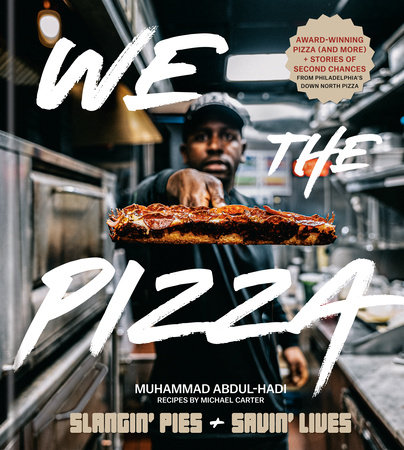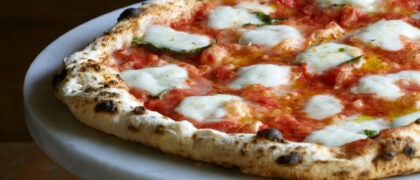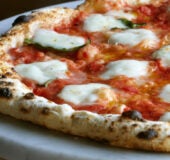IntroductionGrand Opening ChaosOne in every three American Black men my age goes to prison. I went to college, and I studied criminal justice. I owned businesses. My ultimate goal was to help Black people be free.
I used to run a record label. I owned a used car lot and autobody shop. I operated a thriving network of thirteen addiction-recovery houses throughout Pennsylvania, New Jersey, and Delaware. And I had a flourishing real estate business. As a very successful and very serial entrepreneur, I owned the dilapidated building at 28th and Lehigh Streets, in Philadelphia, for five years before bringing it to life as my greatest success (so far): Down North Pizza. Not many people know that during the pizza shop’s grand opening, I wore an ankle monitor and kept it plugged into the wall socket near the deep fryer to keep it charged.
That ankle monitor is one reason why Down North Pizza exclusively employs formerly incarcerated people. Employment is a big part of its mission to provide culinary career opportunities at a fair wage in an equitable workplace. But providing jobs is only the beginning. To fully understand what we’ve done and how we’ve done it, you need to understand why we did it. That story begins before we opened.
While Down North was taking shape, I knew about justice, and I knew about jobs. I did not know about pizza or restaurants. Despite that, in 2018, I spent $250,000 of my own money to build a pizza restaurant with no prior experience in the culinary field and no guidance from others. I went through all the byzantine inspections, permits, licenses, and paperwork to get a restaurant open in the city of Philadelphia. With the help and support of my wife and three kids, I also earned my B.A. in Criminal Justice from Temple University. I knew this pizza shop would work. The mission is what drove me forward.
The plan was to exclusively hire formerly incarcerated people, give them support, and train them for culinary jobs. This kind of pizza shop would help fulfill my lifelong goal of bringing down the recidivism rates in the city. All of my education and most of my entrepreneurship was aimed at helping to keep underprivileged people off the streets and out of jail. I knew in my soul this pizza shop could be the way.
What I did not yet realize was how much value, wisdom, genius, and innovation there was in the streets themselves. You can give someone a job, but you can’t give them their humanity. All you can do is acknowledge it or deny it. In my efforts to provide formerly incarcerated people with jobs, I was reminded that my community is undeniably beautiful in spite of what the system has taken from us. We the Pizza is about our glorious journey and just how far we can go together.
In early 2019, Down North Pizza started getting real. I brought on an up-and-coming Philly chef to run the kitchen (let’s call him “Chef E” because things didn’t work out in the end). Then, that March, I was hit with a federal indictment involving the addiction treatment center that was contracting my recovery-house company. Up to that point, I had managed to escape the carceral system for thirty-three years. My criminal record was nonexistent, which is an accomplishment for a Black man living in inner city Philadelphia. For doing business with the wrong people, I got indicted on twenty-one felony charges and faced up to twenty years in federal prison, with five years’ probation, and potentially had to pay $1.5 million in restitution. (Read the details on page 138.)
That indictment only served to make me more determined to get Down North open.
The slowness of the legal system, which usually crushes lives under the weight of hearings, filings, and continuances, worked to my advantage. Various postponements, including the 2020 pandemic lockdowns, delayed my trial for months. I awaited trial for an entire year, during which time I continued working on the pizza shop. My trial came in June 2020. After the judgment, I had to close my network of addictionrecovery houses, I lost my car dealer’s license, and I couldn’t pursue new business licenses because I now had a conviction. I went on house arrest that summer, could work only limited hours, and had to wear an ankle monitor. But I still kept renovating the shop, hiring staff, and developing the restaurant menu. We started doing pizza popups in the fall of 2020 to test out the menu and the Down North concept, and the response was overwhelmingly positive. It was slow, hard work building a restaurant business while on house arrest, but there was no way I was going to stop. By the time we did the popups, I had enough experience with the carceral system to know that this pizza shop—and its mission—had to succeed.
Everyone on the Down North staff has been imprisoned, including me (house arrest is a form of incarceration). We give people good jobs, fair wages, legal support if they need it, and in some cases, even a place to live rent-free for six months in a governmentsubsidized apartment right upstairs over the shop.
Our Philly spin on Detroit-style pizza is what makes it all possible. Our executive chef, Mike Carter, spent two whole years getting it perfect, while I was dealing with my indictment (more about Mike—and our pizza—on page 60). By the time we finally had Down North’s Grand Opening, on March 19, 2021, our pizzas were dialed in and tasted amazing. People couldn’t get enough of ’em.
Thanks to some good word of mouth from the popups, a little social media, and a few positive local news stories, the community was primed for us to open.
On opening weekend, we got slammed with orders, we were understaffed, and we quickly ran out of supplies, but Mike was—and still is—a beast. He is a master at catering, a talent he picked up while running the kitchen at Greensburg State Correctional Institution, in upstate Pennsylvania. Prison work isn’t something that ends up on your résumé, but Mike learned some valuable skills, and every pizza he turns out is a thing of beauty. The crust is super-crunchy outside and airy inside. The cheese blend (mozzarella, provolone, and cheddar) browns up all lacy and crispy along the edges. And he spoons our signature smoky-sweet-hot Norf Sauce (page 34) over the top. Where Mike’s creativity really shines is in the toppings, like lamb sausage with za’atar and lemon ricotta (see page 104) and berbere-spiced smoked brisket with Harissa Cheese Sauce and Pikliz (see page 117)—some people call it the best Detroit-style pizza outside of the Motor City. I’d like to take that one step further and call it the best and most inventive pizza you’ll ever taste.
During opening weekend, I didn’t touch a single pie. Back then, I didn’t even know how to hold a knife, and I definitely wasn’t expecting to be in the kitchen that day. But from the moment we opened, we had hundreds of orders coming in, both online and in person, and I was needed. “Just keep droppin’ wings and fries,” they shouted out as I manned the fryer. ( I used the wall socket near the fryer to keep my ankle monitor charged.) Mike was throwing down on the pizza build and the bake. Chef E was out front, finishing and expediting. That was our assembly line. This was one of the biggest days of our lives. We had hundreds of orders for pizzas, wings, fries, and shakes—and there were only three of us in the kitchen.
From an operations standpoint, it was a disaster. Not only were we short-staffed, short on raw ingredients, and even short on pizza pans, but also just before we opened the top oven had broken! You better believe that Mike didn’t miss a beat. He turned that top oven into a proofing box for the dough to speed up production. Mike was deep in the pocket—going back and forth from the build to the bake, and then down to the basement for more dough.
From the moment we opened on noon that Saturday, until we closed late that Sunday night, the three of us were rockin’ nonstop. Even when the shop was closed, we were cranking out dough, prepping toppings, and stirring up Norf Sauce.
All weekend long, people lined up down the block and past the library to 29th Street, waiting to get one of our pizzas. We also had stacks of tickets from Tock, our online ordering app, and we didn’t set a limit on how many pies people could order on the app (rookie mistake). Before we even cracked open the door on that first day, we had 100 pies already sold. The people in line didn’t know why other people were just walking up and collecting their pizzas. There was hella confusion, but we made it happen.
Copyright © 2025 by Muhammad Abdul-Hadi with Michael Carter and David Joachim. All rights reserved. No part of this excerpt may be reproduced or reprinted without permission in writing from the publisher.














.jpg)
.jpg)
.jpg)



